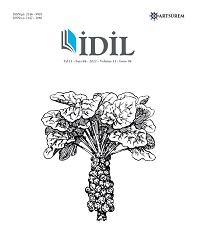HEYKEL SANATINDA MONOKROM ASAMBLAJ LOUISE NEVELSON: KAOSUN ŞİİRSEL DÜZENİ
MONOCHROME ASSEMBLAGE IN THE ART OF SCULPTURE LOUISE NEVELSON: THE POETIC ORDER OF CHAOS
Author(s): N. Fulya Asyalı BüyükermanSubject(s): Visual Arts, Aesthetics
Published by: Sanat ve Dil Araştırmaları Enstitüsü
Keywords: Nevelson; assemblage; monochrome; sculpture; scrap; wall;
Summary/Abstract: Louise Nevelson, whose life intersects with the important historical events and artistic movements of the twentieth century, has created a unique style that can’t be reduced to any of these labels, although her name is associated with many movements such as Cubism, Surrealism, Abstract Expressionism, Minimalism, Feminism. While symmetry and frontality connote primitive connotations in Nevelson's art, modern sensibility reveals itself at first glance with the whole-part relationship and the elements she uses being ordinary objects of use.In the early 1950s, Nevelson expanded the idea of collage into a threedimensional space inspired by cubism by focusing mostly on the use of pieces of wood and other scrap found on the streets, and her assemblages often feature scrap wood from posts, furniture legs, railings to rolling pins and bread boxes. After producing complete assemblages consisting of abstract geometric arrangements in compartments boxes, she produces largesized assemblage sculptures by combining these small compositions and colors all her works in monochrome in order to gain integrity.The visual effect in her large-scale assemblages, defined as 'walls', leads to the opinion that she produced 'hybrid' works in this sense, at a time when the formal boundaries of painting and sculpture disciplines were discussed. Nevelson often talks about being a 'composer' and an 'architect' in her speeches. This gives a clue about her aim to create an aesthetic whole that emerges from the mathematical arrangement of the very different parts. According to her, the artist; beyond the data of material, form and technique, should present an integrity that reflects the essence, spirituality, and ubiquitous meaning of the entire production process of the work.
Journal: İdil Sanat ve Dil Dergisi
- Issue Year: 11/2022
- Issue No: 94
- Page Range: 879-894
- Page Count: 16
- Language: Turkish

